The City of Light’s Other Carb: Our Favorite Croissants in Paris
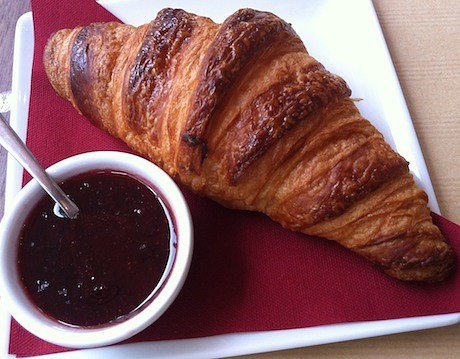
Mon 26 Nov 2012
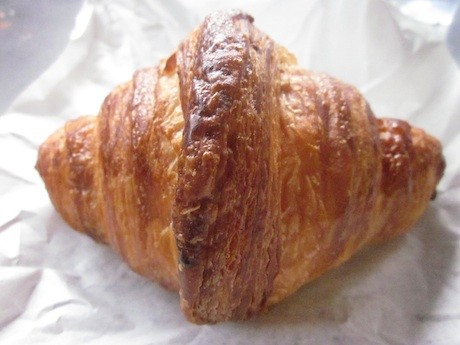
It’s no secret that Paris is one of the culinary capitals of the world. A quick Google search for “best things to eat in Paris” turns up almost 54 million mouthwatering possibilities, including duck confit, roasted chicken, pretty much any kind of cheese you could imagine, steak frites, crispy crêpes, croque-monsieur, pastries, macarons, chocolates and caramels. Search for “best croissants in Paris,” though, and surprisingly, you’ll find that this humble and quintessential French delicacy doesn’t turn up nearly as often on those “best” lists. Even the equally humble baguette gets more recognition than the croissant in Paris, thanks to the sexy-sounding annual competition called the Grand Prix de la Baguette, the results of which give visitors and locals alike a few options to start with for sussing out Paris’s most popular carb-laden cheese accompaniment.
But with no similar competition to guide us and thousands of boulangeries to choose from, the path to the best croissant is less clear. Where to start? We asked David Lebovitz, renowned pastry chef and author of six cookbooks, including The Sweet Life in Paris and the more recent Ready for Dessert, to give us a crash course in finding the best croissants.
Simply narrowing down which boulangerie to try can be overwhelming, but his advice for this is simple: “Look for the lines,” he recommends. “Parisians aren’t early-morning people, and it takes something pretty good to get them motivated in the morning. So places that are crowded usually have good croissants.”
Once inside the door, knowing a little bit about what to ask for is helpful, because surprisingly, not all boulangeries make their own croissants. Says Lebovitz, “A number of [boulangeries] either use frozen dough or buy frozen croissants and just bake them off.” Make sure to ask for the type of croissant you want. “People should always specify a croissant au beurre, which is made with butter, as opposed to a croissant ordinaire, which is made with other fats—and needless to say, should be avoided.”
Lastly, knowing what a good croissant looks like is helpful. A croissant au beurre, according to Lebovitz, isn’t crescent-shaped, but more elongated; the croissant ordinaire is often more curved. In general, Lebovitz says, “I look for ones that are nicely browned and are plump and high. Often there will be little flakes of dough wisping around, which means they’ll be flaky.”
We took this advice, a few recos from Lebovitz (asterisked below), and our taste buds to the Paris streets to see which croissants we liked best. Our findings are below.
Must-Tries
Blé Sucré*
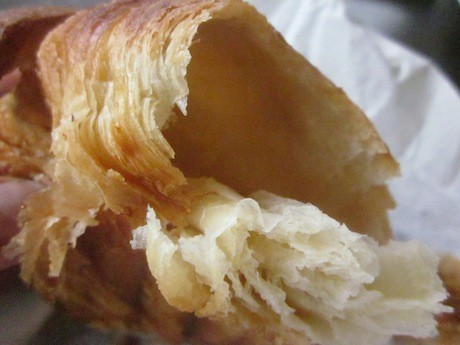 This one looked exactly as Lebovitz described: brown, plump and high. It edged out La Pâtisserie’s ever so slightly as our favorite simply because it was just a tiny bit sweeter—not too sweet, mind you, just a tiny bit less salty, which was our preference.
This one looked exactly as Lebovitz described: brown, plump and high. It edged out La Pâtisserie’s ever so slightly as our favorite simply because it was just a tiny bit sweeter—not too sweet, mind you, just a tiny bit less salty, which was our preference.
La Pâtisserie by Cyril Lignac*
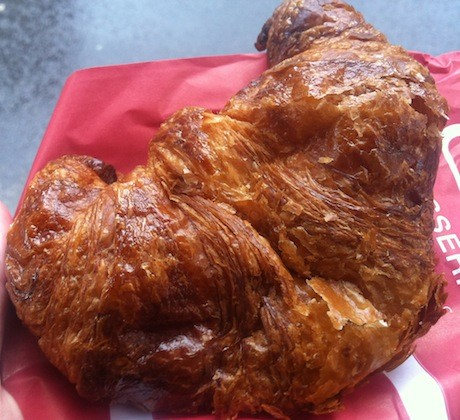 This croissant was slightly browner than the one at Blé Sucré and definitely more buttery, which could have contributed to the slightly saltier taste. Perhaps, as a savvy foodie friend suggested to me, the difference is simply in the type and/or quality of butter used.
This croissant was slightly browner than the one at Blé Sucré and definitely more buttery, which could have contributed to the slightly saltier taste. Perhaps, as a savvy foodie friend suggested to me, the difference is simply in the type and/or quality of butter used.
Good
Pierre Hermé
Had we not tried Blé Sucré’s and La Pâtisserie’s croissants first, this might have made it into the must-try category. But after the perfect sugar-to-salt ratio of Blé Sucré’s and La Pâtisserie’s perfect buttery bites, this medium-brown, medium-buttery, not-too-salty, not-too-sweet croissant was just a little too average compared to those. (Though the rose-almond-raspberry-lychee Ispahan croissant is an absolute must-try.)
Bread and Roses
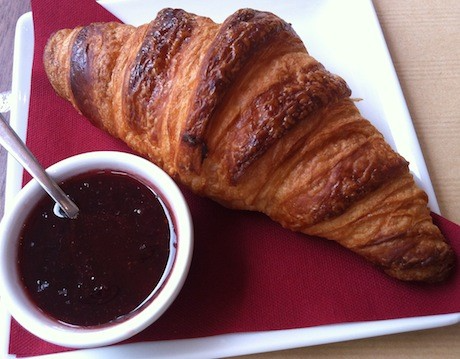 The two we sampled were a little brown (maybe even burned) on the bottom, but the unburned parts were good: golden brown and flaky with a nice buttery flavor. (Note: we tried this one later in the day than all the others we sampled, so we recommend giving them a try early in the morning, before 11 if possible, to get a better idea.)
The two we sampled were a little brown (maybe even burned) on the bottom, but the unburned parts were good: golden brown and flaky with a nice buttery flavor. (Note: we tried this one later in the day than all the others we sampled, so we recommend giving them a try early in the morning, before 11 if possible, to get a better idea.)
Good, but Try the Others First
We chose these four boulangeries on the merits of their baguettes, all of which have won either rave reviews or “best” awards (or both). Our thinking was that if they can excel in one area of carbs, they’re likely to excel in another. But we learned that this isn’t necessarily true; you can’t be the best at everything. The croissants at each of these places were fine but are not the main draw.
Au Levain d’Antan
Le Grenier à Pain
La Boulangerie Jean-Noël Julien
Eric Kayser
We had a great time running around Paris tasting croissants, but it’s probably easier to start your search closer to home or hotel. Lebovitz agrees. “You don’t always need to cross town to find a good croissant; often it’s best to scope out a place in your neighborhood so you can get one in the morning, when they’re nice and warm, and at their buttery best!”
And why stress about finding the best one? After all, half the fun is trying as many as you can.
Related Links
David Lebovitz
Blé Sucré
Square Trousseau, 7, rue Antoine Vollon,
in the 12th Arrondissement. 01 43 40 77 73.
Closed Monday.
Metro: Ledru-Rollin (Line 8).
La Pâtisserie
Pierre Hermé
Bread and Roses
Au Levain d’Antan
6, rue des Abbesses, in the 18th Arrondissement.
01 42 64 97 83. Closed Saturday and Sunday.
Metro: Abbesses (Line 12) or Pigalle (Lines 2, 12).
Le Grenier à Pain
La Boulangerie Jean-Noël Julien
Eric Kayser
Editor’s note: Have you downloaded our gourmet walking trips of Paris yet? They’re available as pdfs or as apps for your iPhone or Android phone.